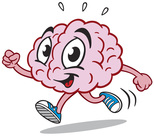 Did you know that physical exercise is better for your memory than completing a crossword or Suduko. We all know that physical exercise is good for our bodies and physical health, but it is also good for our brain health. Just like other muscles of the body if you don't use it you lose it. Exercise affects the brain on several levels research has shown that with physical exercise that increases your breathing and gets your heart pumping there is an increase in the amount of oxygen the brain receives which provides a nourishing environment for growth of brain cells. Also it has been demonstrated that when we get out of breath hormones that are directly related to improving memory and neuroplasticity of the brain are released into the bloodstream, these hormones are called growth factor an increase in growth factors in the brain- making it easier for the brain to grow new neuronal connections new blood vessels and the health of brain cells. Showing that exercise stimulates the brain plasticity by stimulating growth of new connections between cells and strengthening existing connections in a wide array of important cortical areas of the brain. Exercise helps with neuroplasticity there are also direct and indirect ways that exercise can help overall brain health The benefits of exercise come directly from its ability to reduce insulin resistance, reduce inflammation, and stimulate the release of growth factors—chemicals in the brain that affect the health of brain cells, the growth of new blood vessels in the brain, and even the abundance and survival of new brain cells. Indirectly, exercise improves mood and sleep, and reduces stress and anxiety. Problems in these areas frequently cause or contribute to cognitive impairment. Many studies have suggested that the parts of the brain that control thinking and memory (the prefrontal cortex and medial temporal cortex) have greater volume in people who exercise versus people who don’t. So how can we put this into practise??????? Researchers found that regular aerobic exercise, the kind that gets your heart and your sweat glands pumping, appears to boost the size of the hippocampus, the brain area involved in verbal memory and learning. Resistance (weights) training and balance exercise did not have the same effect. Studies have shown that people who walked briskly for one hour twice a week had this improvement, which is a total of 120 minutes of moderate intensity exercise per week. Normal recommendations are based on 150 minutes a week or 30 minutes five days a week. Just remember you can build up to this with as little as 10 minutes a day as you get started exercising. If you don’t want to walk, consider other moderate-intensity exercises, such as swimming, stair climbing, tennis, squash, or dancing. Don’t forget that household activities can count as well, such as intense floor mopping, raking leaves, or anything that gets your heart pumping and breaking out in a light sweat. Comments are closed.
|
�
Categories
All
Archives
July 2023
|
|
Contact Us
Give us a call or send us an email to find out how we can help you on your rehab journey Phone 09 424 3254 [email protected] Visit us 3/55 Karepiro Drive, Stanmore Bay, Whangaparaoa |
Cancellation Policy:
Out of courtesy to your therapist, and other clients who may be waiting for an appointment, please inform us of cancellations as soon as possible.
Cancellations Charges: Short notice cancellations within 48 hours of your appointment or reschedules will incur a late cancellation fee of 60%.
For block bookings, one session will be deducted for three cancelled appointments.
Please be aware that ACC does not cover all cancelled appointments.
How to Cancel Your Appointment
If you need to cancel your appointment, please call us at 09 424 3254 between the hours of 8am – 5pm. If necessary, you may leave a detailed voicemail message. We will return your call as soon as possible.
Late Cancellations/No-Shows
A cancellation is considered late when the appointment is cancelled less than 48 hours before the appointed time. A no-show is when a patient misses an appointment without cancelling. In either case, we will charge the patient a 60% missed appointment fee.
Out of courtesy to your therapist, and other clients who may be waiting for an appointment, please inform us of cancellations as soon as possible.
Cancellations Charges: Short notice cancellations within 48 hours of your appointment or reschedules will incur a late cancellation fee of 60%.
For block bookings, one session will be deducted for three cancelled appointments.
Please be aware that ACC does not cover all cancelled appointments.
How to Cancel Your Appointment
If you need to cancel your appointment, please call us at 09 424 3254 between the hours of 8am – 5pm. If necessary, you may leave a detailed voicemail message. We will return your call as soon as possible.
Late Cancellations/No-Shows
A cancellation is considered late when the appointment is cancelled less than 48 hours before the appointed time. A no-show is when a patient misses an appointment without cancelling. In either case, we will charge the patient a 60% missed appointment fee.

 RSS Feed
RSS Feed
